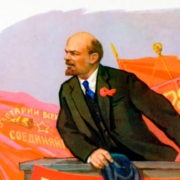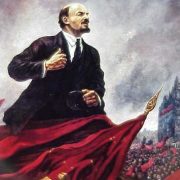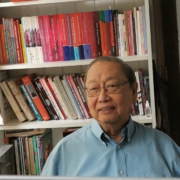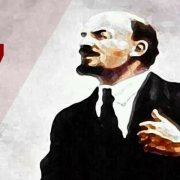Lenin’s Desire: Reminiscences of Lenin and the Desire of the Comrade
“Lenin’s Desire: Reminiscences of Lenin and the Desire of the Comrade” is a paper contributed by Jodi Dean to the LENIN ONLINE, a series of Internet-based presentations organized by ILPS Philippines and BAYAN to commemorate Lenin’s 150th birth anniversary. The paper was recorded live and aired in Episode 2, posted on 18 April 2020. Episode 2 may be viewed on Youtube by clicking on this link.
Lenin’s Desire: Reminiscences of Lenin and the Desire of the Comrade
By JODI DEAN
Thank you to ILPS and Bayan – very happy to be part of the celebration of Lenin’s 150th birthday. My remarks today consider Lenin’s Desire. I focus on the memoirs written by Nadezhda Krupskaya, his comrade and wife.[1] My remarks are also informed by psychoanalysis, so there will be a brief exposition of the ideas of subject and desire in the theory of Jacques Lacan. As you will see, the question of Lenin’s desire involves organization, comradeship, and the desire of the proletariat. My remarks have five parts.
Part 1
From a bourgeois perspective, that is to say, from the perspective of romantic comedies, fake intimacy, and the patriarchal family, Nadezhda Krupskaya’s Reminiscences of Lenin is a strange duck. Krupskaya was Lenin’s wife, yet her memoirs don’t describe how they fell in love. Instead, the two have discussions and take walks. Krupskaya shares with Lenin the details of her work teaching in an adult education school and producing and distributing agitational leaflets. There is no endearing marriage proposal. While both are in exile in Siberia, Krupskaya registers as Lenin’s fiancé in order to get transferred to his village. It’s not clear when they get married. Writing this off as bohemian free love attempts to slide romance in through the backdoor (and everybody knows Lenin rejected the “glass of water” theory of sex).[2] Something uncanny, even machinic is at work in Krupskaya’s reminiscences: where we want to see sex, we find organization. Of course, this is only strange if your perspective is bourgeois.
From a communist perspective, the desire that shapes the text is familiar. The collective intimacy of comrades replaces the romantic intimacy of the couple; the two are two of many. Absorption in the political struggle for the Party, for the emancipation of the working class, for the revolution, and for socialism remakes familial relations. Krupskaya reports that Vladimir Ilyich loved his mother a great deal: “’she has tremendous will-power,’ he told me once” (51). About her own mother, Krupskaya writes, “In March my mother died. She had been a close comrade, who had helped in all our work. In Russia, during police raids, she would hide all illegal materials. She took parcels and messages to comrades in prison. She had lived with us in Siberia and abroad, entertained the comrades who came to see us, made special vests with illegal literature sewn up in them, written the “skeletons” for invisible-ink letters, etc. The comrades loved her” (303-304). These descriptions seem impersonal. They could apply to any one, any comrade dedicated to living the struggle. And this is the point: communist desire involves intimacy of a new kind, one where love attaches not to some unique and irreplaceable trait or person but to a model that can be emulated, that must be copied and reproduced if the revolution is to succeed. The comrades love Krupskaya’s mother for her discipline and dedication. Krupskaya loves her mother like a comrade. Collective desire for collectivity produces a closeness all the more intense for its exceeding of the merely personal.
Krupskaya’s reports on Lenin’s and her mothers are also striking in that the mothers are figured in terms that describe Lenin’s and Krupskaya’s own desires—tremendous will-power, detailed help in all the work, the love of comrades. What Krupskaya sees in their mothers is how she sees Vladimir Ilyich and herself, and how she sees both of their aspirations for the Party. She says explicitly that Vladimir Ilyich inherited his mother’s “strength of mind” (52). And much of the book details her own organizational work and close connections with comrades. The identification is clear.
What’s not so clear is its direction. Is Krupskaya a comrade because her mother was a comrade or is her mother a comrade because of Krupskaya? Frankly speaking, for much of the book it appears as if Krupskaya and Lenin are dragging the poor woman all over Europe as they spend their time in exile moving from city to city. Likewise, is Lenin’s mother depicted as having a strong will because of how Lenin’s own will is imagined or does he like imagining himself this way because it lets him carry something with him of his mother? Does their desire shape how they imagine their mothers, does how they imagine their mothers shape their desire, or does the comradely desire of communists reshape it all?
These unanswerable questions illuminate another knot of desire, the entanglement of Lenin, class, and Party. They point to the mutual constitution of subject and Other, their dialectical interrelation and dependence on an organizational infrastructure. And they open a path into communist desire as a collective desire for collectivity and the Party as its necessary material support.
Part 2 The dialectic of desire
One of Lacan’s most well-known slogans is “desire is the desire of the Other.” Another way of putting it is that “the subject is caused by the Other’s desire.” The basic idea is that the subject isn’t natural, given, or primary. The subject emerges dialectically through engagement with the Other, with an order of language and meaning exterior to it and in and through which the subject comes to be.
Lacan specifies alienation and separation as the processes through which the subject is constituted. Alienation involves submission to signification and language, which means significant and language is Other. In order to be, the subject has to be in language. But language is inadequate: you can’t say everything you want; it’s hard to put things in words. The very medium that makes the subject possible makes it lacking; something of the subject exceeds the form that structures it even as this excess would not be “of the subject” without the form or structure, without the language, that makes it possible. So the subject emerges as deprived (a Freudian name for this deprivation is “castration”). By itself, the process of alienation doesn’t produce a subject. It produces the place of the subject, the site that the subject may come to occupy, the necessary condition for a subject. So subjectivity requires an additional second process, separation. Separation involves a confrontation with the Other, more specifically, with the desire of the Other, which means the lack in the Other. In separation, the subject recognizes that the Other, too, is lacking. It tries to fill this lack, to make its lack overlap with the lack in the Other. The subject tries to make itself the object of the Other’s desire, to be what the Other wants, even when, especially when, it doesn’t know and can’t be sure what the Other wants. The subject’s desire takes shape as the desire of the Other even as it will never, or rarely, be able fully to occupy that position. Separation, then, is an effect of the gap between the two lacks, the failed superimposition of the lack in the subject with the lack in the Other.
For example, the child tries to figure out its mother’s desire so that it can fulfill it. But what it actually realizes is that it is not the mother’s sole interest. Mother has other interests. She has priorities and desires that precede the child, that do not involve the child. We might also illustrate the same point with respect to the university. The university precedes any specific students. Entering students receive a number, an identification card, a designator of their place. The students try to figure out their place in the university. Who are they for, what is wanted of them? They will feel made to conform to expectations and practices not their own in order to recognize themselves as the students they are told that they are. Even as they try to fathom what is demanded of them and to meet these demands, a gap will remain that they will struggle to symbolize, represent, negotiate.
The familial and academic examples help make sense of the dialectic of desire because the positions within them are relatively fixed. We expect the child and the student to be in the position of the subject struggling to emerge, the mother and university to supply the supportive yet demanding and engulfing presence against which this struggle unfolds. But what if the positions of subject and Other are not so clear? What if they are more unstable, co-constitutive, reversible? What if the Other is caused by the subject?
Part 3 What do workers want?
Krupskaya’s Reminiscences of Lenin is a story of party building. Lenin is as much a product of revolutionary working class struggle as he is a leader of it. Krupskaya writes, “Leaders are formed in and grow out of the struggle from which they draw their strength” (7). She presents the process of formation as the never-ceasing problem of organization. The dynamic throughout the book involves passionate engagement, intense absorption in the details of workers’ lives, the mechanisms of communication linked to creating and distributing the all-Russia newspaper, the infrastructures of organizational practice. Accompanying these concerns are periods of exhaustion, over-extension, “frayed nerves,” and the necessity of stepping back, heading to the mountains, and enjoying nature—what today’s activists would call self-care. To recall Lenin is to recall him in becoming, in the context of the formation of class, party, revolution, and socialist society.
Krupskaya details Lenin’s commitment to the fight against oppression and exploitation; “his whole life was bound up with that cause.” Lenin was “devoted to the cause of the proletariat, the cause of the working people, and took their interests just as closely to heart” (7). She highlights his emphases on “establishing close contact with the masses, getting closer to them, learning to be the vehicle of their finest aspirations, learning how to win their confidence and rally them behind us” (26). Lenin’s faith in the “creative power” and “historic mission” of the proletariat grew out of his “profound knowledge and thorough study of the facts of life” (108). As Krupskaya explains, “His work among the St. Petersburg proletariat has helped to identify this faith in the power of the working class with real life people” (108). Lenin’s faith manifests in his particular gift in knowing how to read workers’ letters (109). Where others might detect barely literate confusion, Lenin finds “inexhaustible energy, a readiness to fight to the victorious end” (109). He had a sense for “the moods of the working class at a given moment” (113). He “knew and understood what the masses wanted,” Krupskaya tells us (111 -112).
Solving the organizational problem, figuring out how to channel and direct political work consumes Lenin. He works out organizational questions incessantly, sleeplessly. How can bodies, political associations, that do not yet fully exist, that are still being formed, be coordinated, practically and ideologically? Krupskaya writes that “It was Vladimir Ilyich’s passionate desire to create a united, solid party, merging into one all the detached groups whose attitude to the party was based on personal sympathies or antipathies. He dreamt of a party in which there would be no artificial barriers, national ones included” (84). Among the squabbling emigres, party work is frustrating, often undermined by constant interpersonal conflict. In the hard years spent abroad following the defeats of 1905, the bickering intensifies, sometimes channeled into principled questions of materialism and tactical questions of legal and illegal work, sometimes dragged down into the “ugly scum” of scandal (208). Lenin tries to keep personal grievances at bay and remain focused on the cause at hand. The effort wears on his nerves.
After the February revolution, although still stuck in Switzerland, Lenin attends to the concrete details of revolutionary struggle. He proposes a new militia of armed men and women. They will serve as sanitary inspectors, arrange for the distribution of bread and milk to children, and address housing questions by commandeering palaces. Lenin knows full well that these distributive measures are not socialist. But active work in militias will provide the practical education necessary for socialism. Yes, the situation calls for insurrection and Lenin waged a relentless struggle with comrades in his own party over the insurrectionary moment. Yet he was preoccupied with the practical infrastructure crucial to success. Krupskaya quotes Lenin’s Letters from Afar: “On the order of the day is the task of organization, but certainly not in the stereotyped sense of working only on stereotyped organizations, but in the sense of drawing unprecedentedly broad masses of the oppressed classes into an organization and of making this organization itself take over military, state and national-economic functions” (339). What mattered most was meeting the concrete needs of the masses by organizing them in a new way (340).
Lenin’s focus on organization intensifies after the success of the October revolution. He is wholly occupied “with the problem of remodeling the entire machinery of government, reorganizing the masses along new lines, weaving anew the whole social fabric” (373). Building socialism is a matter of organization. How can workers’ lives be arranged for the better? What is the best way to organize consumers’ cooperatives? How can the Soviet government make sure that children receive the milk they need? What are the mechanisms for getting workers into better apartments? What sort of accounting mechanisms does all this require? And, most important of all, how can this work be organized so that it be the work of the masses themselves? (428)
Part 4 Organizing desire
So, to return to the questions of subject, other, and desire: who is the subject of Reminiscences of Lenin? If it is Lenin, then the proletariat is the Other. And, since desire is the desire of the Other, Lenin’s desire is the desire of the proletariat. The workers’ movement precedes him—there are Marx and Engels, the Paris Commune, Chernyshevksy and Narodnaya Volya; there is a strong and growing German Social Democratic Party and rising discontent in Russia. The needs and desires of the masses precede Lenin and he finds himself in them. He finds his own desire in theirs. Lenin as subject is constituted through his engagement with the proletariat. He tries to determine what they want, to be what they want; as Krupskaya told us, he can read their letters like no one else can. Lenin attends to every little detail of workers’ stories, lives, experiences, and reports. He recognizes, moreover, that the workers’ needs are vast, that he cannot meet them. And he endeavors to create ways for them to do it themselves. What does the proletariat lack? Organization. There in the overlap of two lacks, two desires, the Party appears, the organizational form of Lenin’s separation from the proletariat.
But what if the proletariat is the subject and Lenin is the Other? Krupskaya’s Reminiscences tells the story of collective work and the building of collectivity; it’s a communist story of common struggle for universal ends. The possibility that the proletariat is the subject is not far-fetched when we acknowledge the division between the working class understood as an empirical designator of social position and role in production and the proletariat as a universal revolutionary subject. As empirical designator, working class refers to an object given in capitalist relations. As revolutionary subject, proletariat points to an effervescence, a momentary heterogeneous unity that may or may not emerge. In the Marxist tradition, proletariat is a category associated with class consciousness and the moment when the class acts in-itself and for-itself. In the proletariat, universality achieves agency.
As we all know, The Communist Manifesto outlines such a process of becoming: individual workers react to oppressive conditions by destroying means of production; these activities spread regionally and across different sectors of work; unions are formed and then a party as collective awareness of the political nature of the struggle radicalizes and intensifies the workers’ movement. Over the course of its movement, the proletariat produces new leaders, organizations, and forms of struggle—the very story of Krupskaya’s Reminiscences. Through these leaders, organizations, and forms of struggle, the workers come to see themselves as a class and as a class with power. Leaders represent the workers’ power back to them. Krupskaya tells us that Lenin learned to be a vehicle for the masses’ “finest aspirations”—not for all of them. Leaders offer up slogans as demands, and as possible expressions of desire; is this what you demand now? When leaders get it wrong, no one follows and they cease to be leaders, or perhaps they never were. The working class as a class doesn’t know what it wants, doesn’t have a collective desire, until this desire is given back to them: Peace? Bread? Land? Nothing less than the overthrow of the state? All power to the Soviets? That the class doesn’t know what it wants is another way of saying that its desire has not yet been given expression. The Other is the site where this occurs. Naming the desire brings it into being as the desire of a subject.
If alienation is the process whereby a place in language is opened for the subject, then we have a psychoanalytic explanation for Lenin’s insistence on an all-Russia newspaper. Yes, of course, for tactical reasons of party building. But the paper could only be a good tactic for party building if it brings to expression something of workers’ desire. Prior to its alienation in language, the subject isn’t there; it has no being. The subject—the Russian proletariat—is an effect of the place made for it, even as it necessarily exceeds this place.
With regard to the Party: the class is not coterminous with the Party. The class needs the Party as a political form, a form for political struggle against the conditions that produce the class, even as the very fact of the Party marks the separation of the subject from the Other, the proletariat from Lenin. Why? Because the Party provides the material infrastructure that supports the proletariat as a political subject. Lenin can’t do this alone. Producing, supporting, steering the proletariat requires a practical instantiation, a new form of organization or apparatus of proletarian desire. The all-Russia newspaper—its authors, editors, and printers, and the elaborate secret network for distributing it in Russia and then supporting the comrades who get caught and arrested—was a condition for communicating with the masses, for organizing workers, for generating a shared understanding of the situation. This work not only brought together previously disparate groupings of socialists and revolutionaries; it not only communicated ideas to workers; it also served as a means for building and strengthening the party organization. Again, the Party is situated at the site of the overlap of two lacks.
Lenin’s desire throughout Krupskaya’s Reminiscences is expressed as a desire for organization. It’s not simply his desire for a Party capable of expressing and guiding the desire of the proletariat, not simply his desire for something more than small, squabbling friendship groups, something more than reading circles or intellectuals and committeemen, something more than an underground network or an electoral grouping. Something more—every little detail—is what has to be organized for socialism to be built. Organization expresses the desire of the proletariat because it is through organization—the reorganization of life—that the proletariat builds socialism. Organization is what enables the people to direct their lives; it’s the way they direct them, how they get things done. Collective work produces collective desire or, organization is the way communist desire is collectivized.
Part 5 Conclusion: Invisible ink
Krupskaya relates an “amusing adventure” she had while trying to meet up with Lenin in Europe after her exile came to an end. It’s a story of desire and organization. Thinking that Lenin was in Prague living under the assumed name Modráĉek, she sends him a telegram to meet her at the train. Lenin doesn’t show up. After a long wait, Krupskaya gives up and goes to the address of a large tenement building. She knocks on the door of the fourth floor apartment. A woman answers and Krupskaya says, “Herr Modráĉek. Herr Modráĉek.” A workman comes to the door and identifies himself as Modráĉek. Krupskaya, bewildered, responds “No, it’s my husband.” At first puzzled, the worker concludes that Krupskaya “must be the wife of Herr Rittmeyer. He lives in Munich, but sent books and letters” through him, Herr Modráĉek (52 – 53). Krupskaya spends the whole day with Modráĉek sharing notes about the movement. She then goes to Munich. The first flat she goes to ends up being a beer-house. She approaches the barkeep, asks for Herr Rittmeyer, and gets the answer “That’s me.” Krupskaya responds, “No, it’s my husband.” Herr Rittmeyer’s wife comes in and says, “Ah, it must be Herr Meyer’s wife. He is expecting his wife from Siberia.” So she takes Krupskaya through the building and into a flat where Lenin is sitting with his sister and Martov. Krupskaya is massively angry and immediately begins to yell at Vladimir Ilyich: “Damn it all, couldn’t you write and tell me where you were?” Lenin says that he had written and that he had been at the station three times a day. “How did you get here?” he asks. Krupskaya ends the story: “As we afterwards learned, the Zemstvo man to whom the book with the address had been sent had kept the book to read” (53).
Communist desire: organized associations, assumed names, a chain of connections and a worker’s desire as the site of excess and lack. The book arrived at its destination, and so did Krupskaya. Her story is about getting there. #
Sources
Bruce Fink, “The Subject and the Other’s Desire,” Reading Seminar I and II: Lacan’s Return to Freud, eds. Richard Feldstein, Bruce Fink, and Maire Jaanus (Albany, NY: State University of New York Press, 1996) 76 – 97.
Jacques Lacan, The Four Fundamental Concepts of Psychoanalysis, The Seminar of Jacques of Lacan Book XI, ed. Jacques-Alain Miller, trans. Alan Sheridan (NY: Norton, 1998).
Nadezhda K. Krupskaya, Reminiscences of Lenin, trans. Bernard Isaacs (Chicago, IL: Haymarket Books, 2018).
NOTES
[1] Numbers enclosed in parenthesis inline refer to the page number in Krupskaya’s Reminiscences where the quotation or reference is cited.—PRISM Ed.
[2] This so-called theory, dubiously attributed to Alexandra Kollontai, asserts that in communist society the satisfaction of sexual desires will be as simple and unimportant as drinking a glass of water. The assertion triggered a debate among Bolsheviks on matters relating to Marxist views on sex, love, and women’s liberation.—PRISM Ed.
AUTHOR: Jodi Dean is a community organizer and a professor at the Hobart and William Smith Colleges in New York State. Her recent books, The Communist Horizon, Crowds and Party, and Comrade honor the legacy of Vladimir Lenin and the necessity of a proletarian revolution in our age.







Leave a Reply
Want to join the discussion?Feel free to contribute!